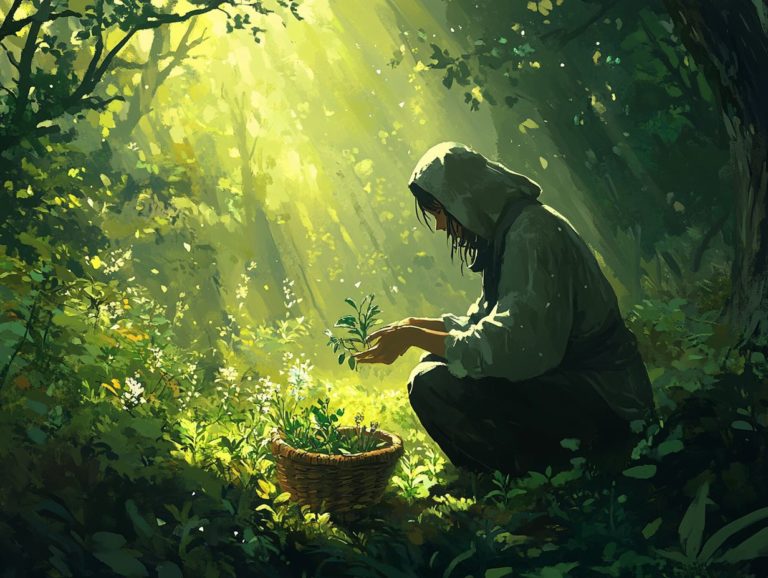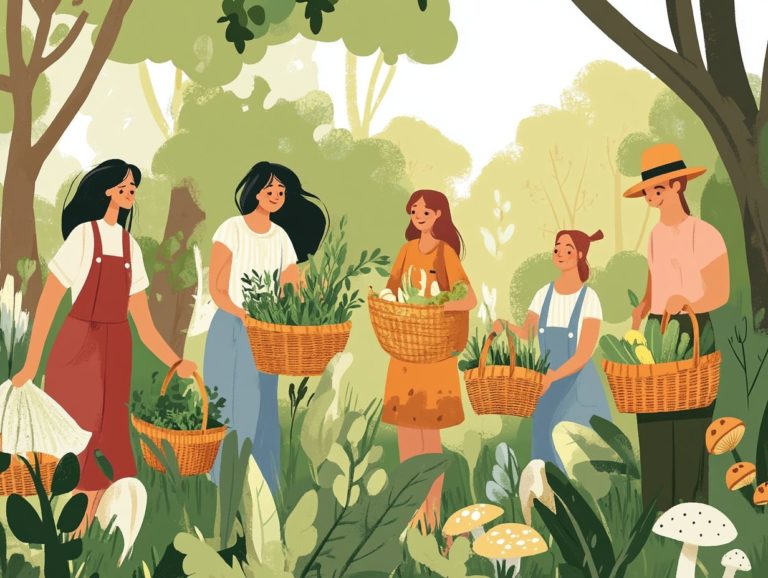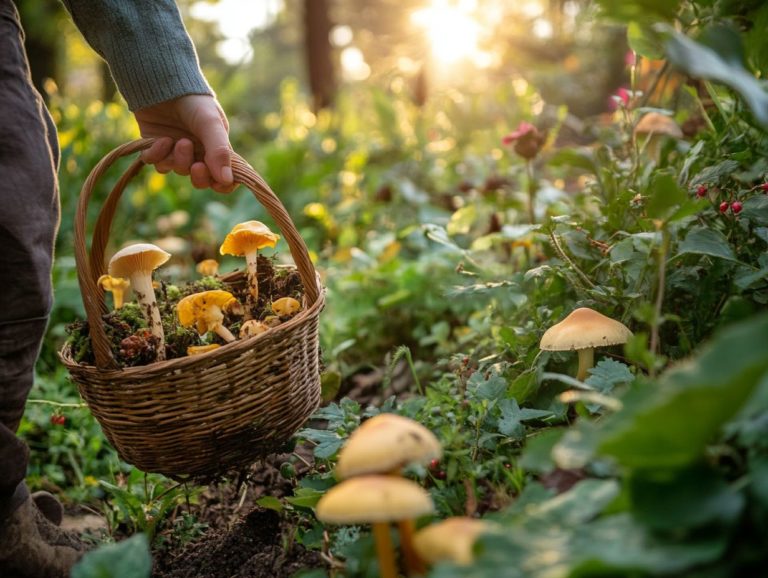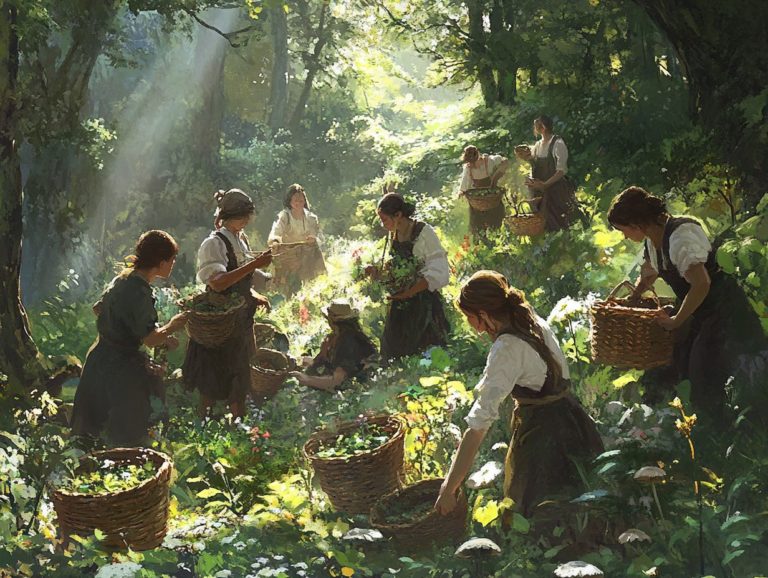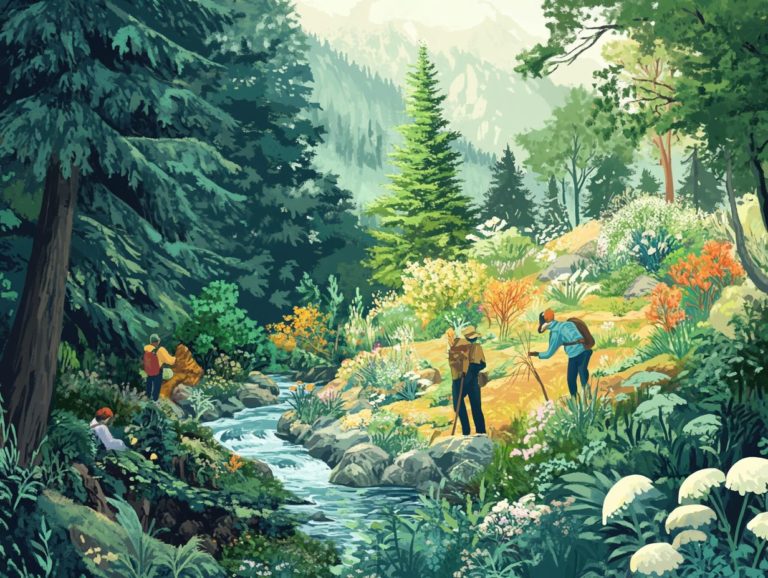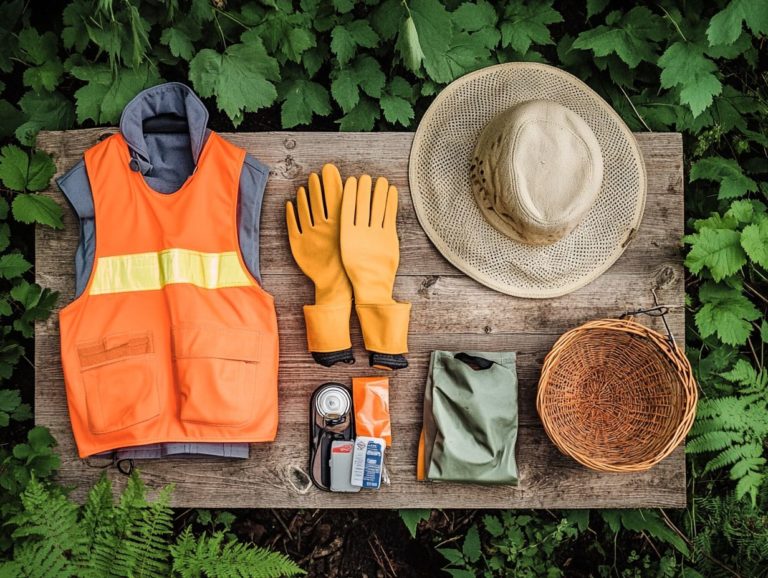How to Use Local Resources for Sustainable Foraging
Sustainable foraging transcends fleeting trends; it’s a thoughtful way to source food that connects you with the rich offerings of your local environment.
This article explores the many benefits of using local resources, highlighting both environmental and economic advantages. You will discover practical methods to identify and harvest wild edibles, along with essential safety tips to ensure your foraging experience is enjoyable and secure.
Uncover creative recipes that showcase local ingredients and learn how to promote sustainable practices within your community. Get ready to unlock the secrets of foraging responsibly and enrich your culinary journey.
Contents
- Key Takeaways:
- Benefits of Using Local Resources
- Identifying and Harvesting Local Resources
- Safety Considerations
- Creative and Sustainable Recipes
- Supporting Sustainable Foraging Practices
- Frequently Asked Questions
- What are some examples of local resources that can be used for sustainable foraging?
- Is it legal to forage for wild plants and resources in my local area?
- How can I ensure that I am foraging in a sustainable and ethical manner?
- What are some benefits of using local resources for sustainable foraging?
- What tools or equipment do I need for foraging?
- Are there any precautions I should take when foraging for local resources?
Key Takeaways:
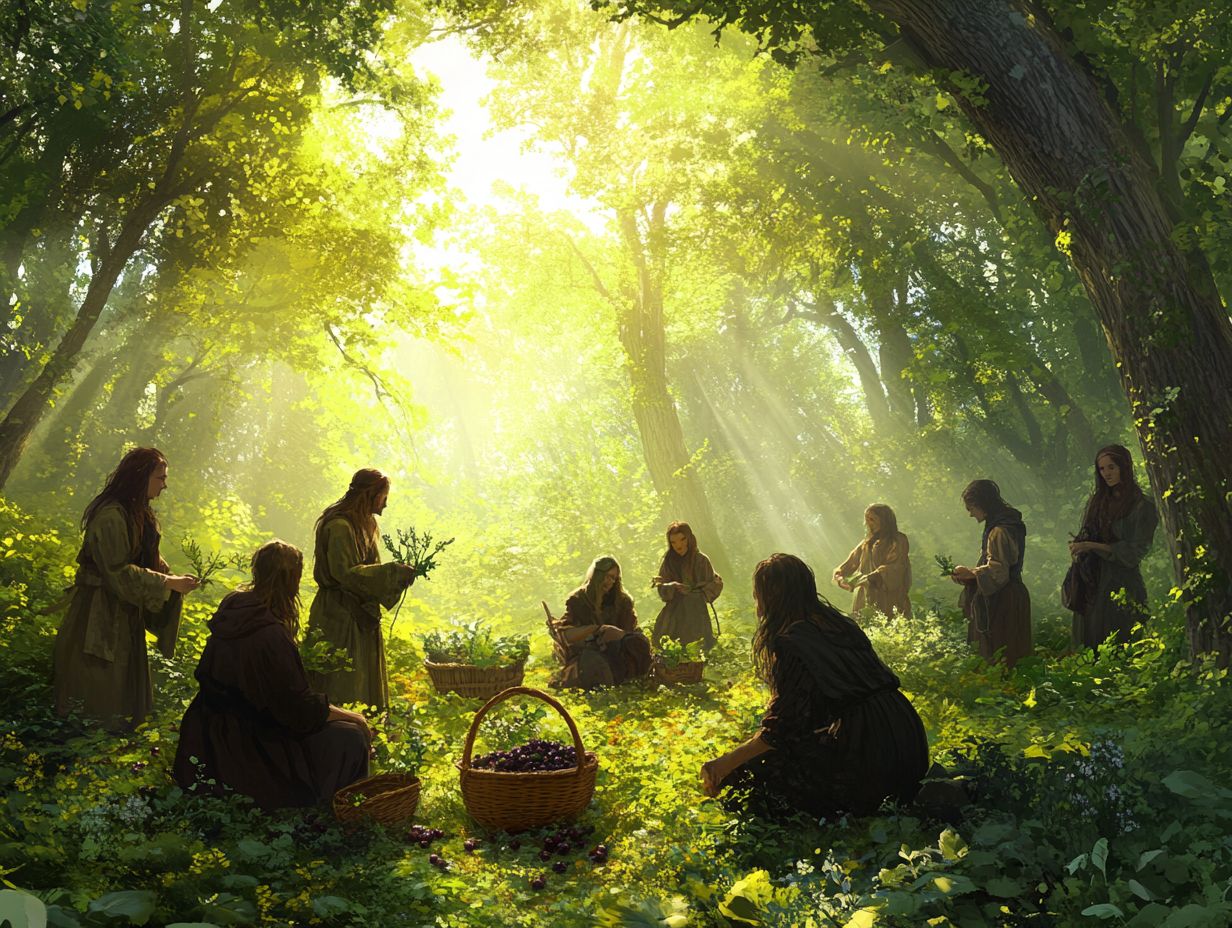
- Utilize local resources for sustainable foraging to benefit the environment and economy.
- Identify and harvest local resources using sustainable methods while always considering safety.
- Incorporate local resources into creative recipes and support sustainable practices.
What is Sustainable Foraging?
Sustainable foraging is an ethical practice that allows you to gather wild food from urban gardens, public parks, and local ecosystems while minimizing your environmental impact and preserving natural resources. For those interested in this practice, exploring the top resources for sustainable foraging can enhance your knowledge and promote community involvement and education while respecting the traditional knowledge of Indigenous peoples.
As an urban forager, you might seek out wild edible plants like dandelions and plantains to enhance your diet, deepening your appreciation for local biodiversity and food systems.
By embracing the principles of sustainable foraging, you become more attuned to your natural surroundings and the cycles of wildcrafting. This approach gives you a comprehensive understanding of the interconnectedness within local food networks. Engaging with community-supported foraging initiatives not only heightens your awareness of local plant species but also fosters shared knowledge and cooperation among fellow foragers. To enhance your foraging experience, it’s essential to refer to the best local resources for foraging safety, ensuring ethical and sustainable practices.
As you learn to identify plants accurately, you enable yourself to respect nature’s contributions, reducing harmful harvesting and promoting ecological balance. In a world where food systems often lean heavily on industrial agriculture, foraging serves as a vital reminder of the abundance available just beneath your feet, linking your culinary practices to a commitment to environmental stewardship.
Benefits of Using Local Resources
Utilizing local resources for foraging offers numerous benefits that go beyond personal gain. It enhances community health, promotes food justice, and addresses pressing environmental issues linked to food systems and sustainability. For more information, explore resources that can help with foraging.
By immersing yourself in local ecosystems and participating in community gardens, you play a vital role in fostering food resilience and strengthening local food networks. Engaging in ethical foraging not only enriches your experience but also raises your awareness of invasive species and highlights the importance of plant conservation, deepening your connection with the environment.
Join the movement of foragers today and rediscover what’s available in your backyard!
Environmental and Economic Advantages
Sustainable foraging offers amazing environmental and economic benefits. By harvesting wild edible plants responsibly, you reduce your reliance on commercial farming, which often uses herbicides and pesticides. To enhance your foraging efforts, consider using technology for sustainable foraging. This helps preserve local ecosystems.
Joining community-supported foraging initiatives allows you to actively participate in local food systems. This fosters a sense of food security and resilience within your community.
This practice enhances biodiversity conservation by protecting natural habitats. It also encourages the growth of urban gardens, transforming neglected spaces into thriving, productive areas. Supporting local economies through foraging opens up opportunities for ethical harvesting while lowering grocery costs.
The emphasis on food sovereignty puts the power back in your hands. This allows you to take charge of your food sources, promoting health and well-being while reducing the carbon footprints linked to transportation.
This holistic approach connects community health, environmental stewardship, and economic sustainability, creating a relationship that benefits everyone involved.
Identifying and Harvesting Local Resources
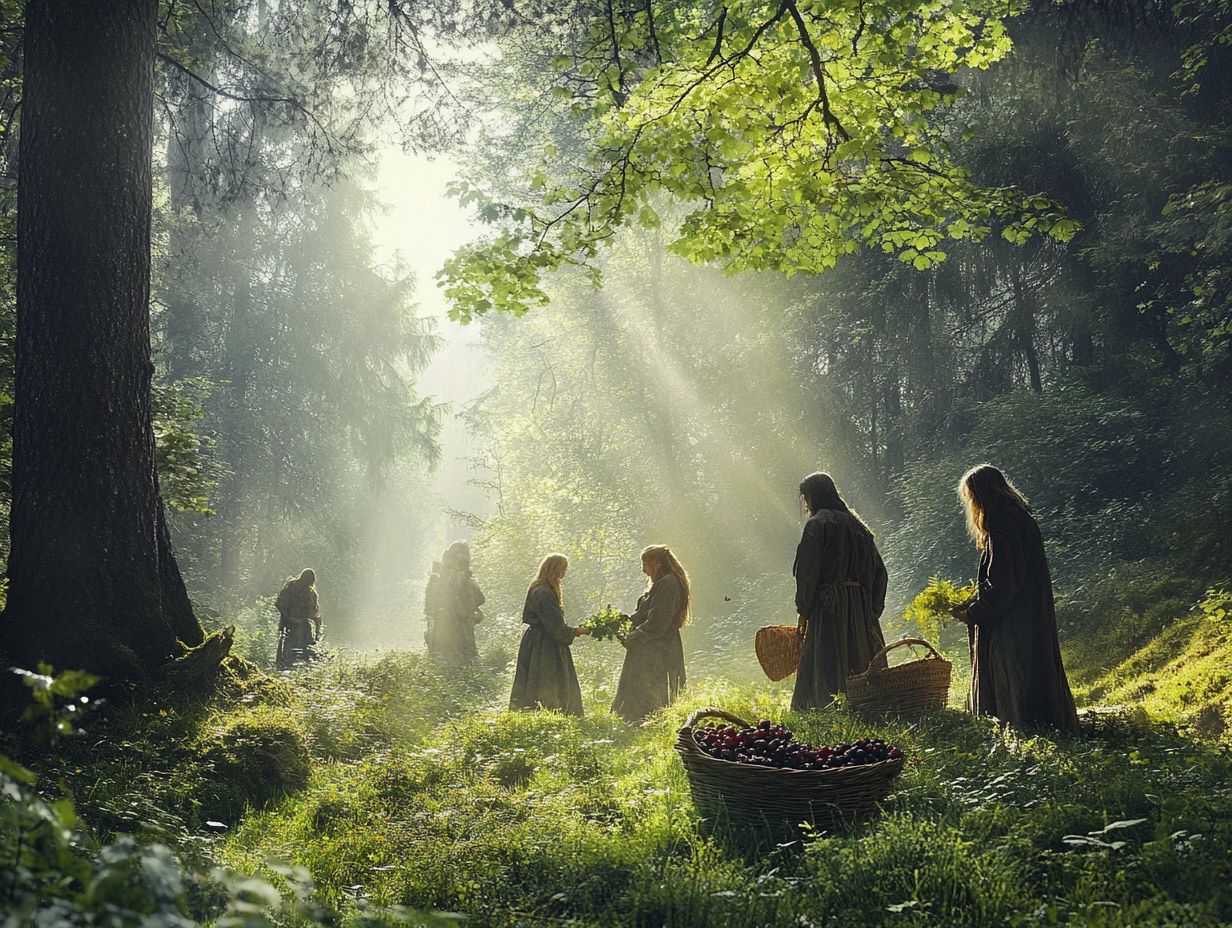
Identifying and harvesting local resources requires sharp skills in how to identify plants, along with understanding the ethical guidelines for sustainable harvesting. As an urban forager, immerse yourself in the wild edible plants native to your area by exploring the best local resources for foraging edibles. Get to know common varieties like chickweed and elderberry.
It’s essential to adhere to local regulations, including obtaining any necessary foraging permits. Understanding this helps you appreciate nature and supports responsible foraging practices key for preserving local ecosystems.
Methods for Sustainable Foraging
Implementing effective methods for sustainable foraging is crucial for ensuring the longevity of wild food sources and the health of local ecosystems. For more information, check out the best resources for local foraging.
By adopting these practices, you bolster your food security while engaging in environmental stewardship that honors indigenous cultures and their traditional knowledge. Community engagement initiatives such as workshops and guided foraging tours create invaluable opportunities to learn and connect with fellow residents, highlighting the environmental implications of your choices.
These educational efforts enable you to champion food justice, helping marginalized communities reclaim their relationship with the land. In this context, foraging transforms from a mere activity into a meaningful practice rooted in respect and reciprocity with nature.
Safety Considerations
Safety is crucial when foraging for wild edible plants. Improper identification or harvesting methods can make you very sick.
As an urban forager, it s essential to distinguish between edible and toxic plants, such as kudzu and plantain, to mitigate risks effectively.
Be mindful of the environmental implications of foraging such as preserving medicinal plants and native species. This not only supports community health and safety but also fosters a sustainable relationship with the natural world.
Precautions for Foraging and Consuming
Taking the necessary precautions when foraging and consuming wild food is vital for your adventure to avoid potential health risks associated with wild edible plants, particularly in urban environments.
As an urban forager, arm yourself with knowledge about the safe consumption of plants like dandelion and chickweed. Stay alert to environmental factors that might affect food quality. By gaining a deeper understanding of local ecosystems and food systems, you can navigate the associated risks more effectively.
Ensuring that your foraging practices contribute positively to community health is crucial. Recognize that some areas may be contaminated due to pollution or chemical runoff, which can pose serious health implications.
Be aware of potential allergies to certain plants to enhance your safety. Engaging in responsible foraging boosts your personal health and promotes equal access to nutritious food sources while being mindful of the environmental impact of your choices.
Creative and Sustainable Recipes
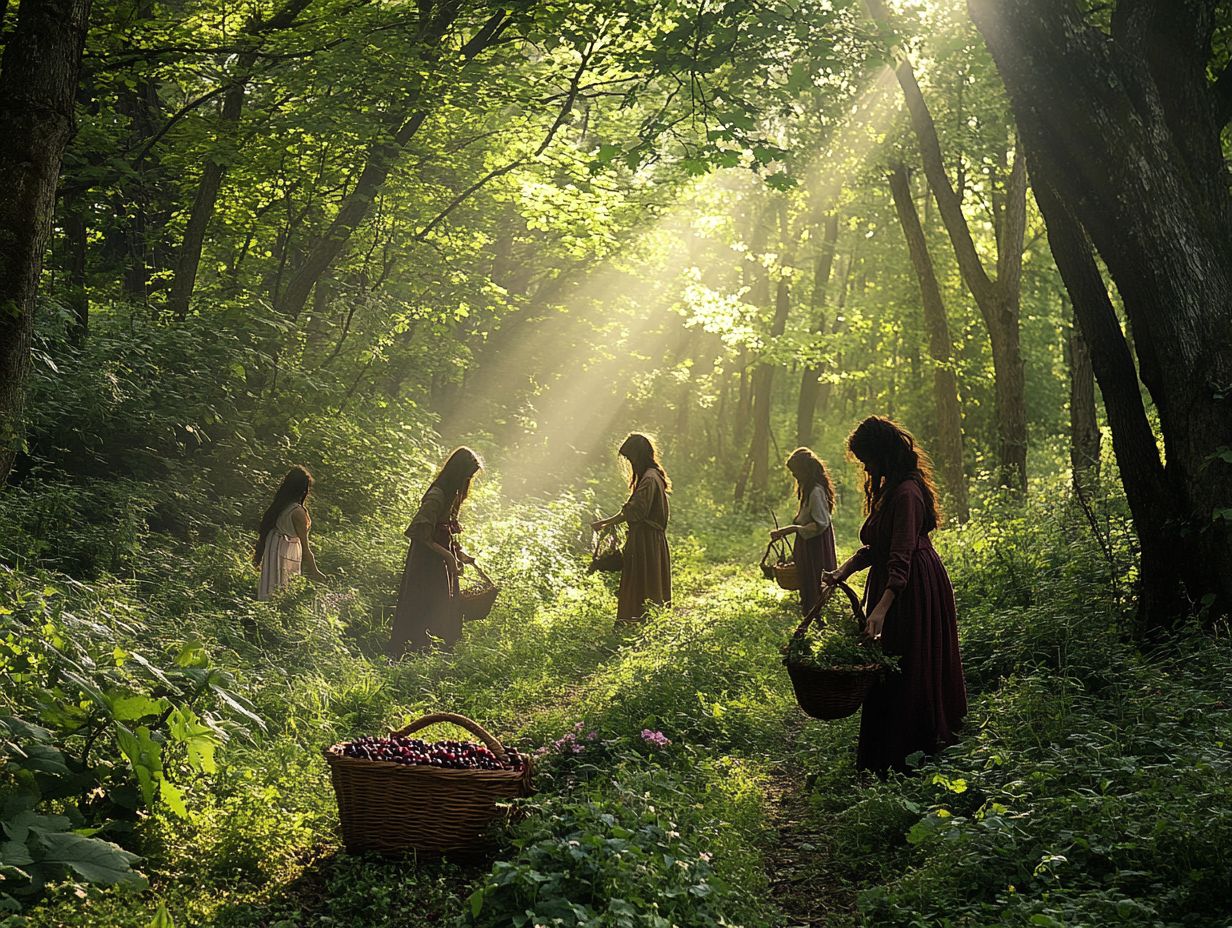
Creative and sustainable recipes that incorporate wild edible plants significantly enhance your diet while fostering food resilience and supporting community health. As an urban forager, you have the opportunity to utilize ingredients like elderberry and chickweed to craft delightful dishes that deepen your connection to the local ecosystem, especially by using foraging techniques in responsible living.
These recipes highlight the remarkable versatility of wild foods and inspire you to explore community-supported foraging initiatives. Embrace the ethical sourcing of ingredients!
Incorporating Local Resources into Meals
Incorporating local resources into your meals is a rewarding way to embrace sustainable eating and celebrate the abundance of each season.
By utilizing wild edible plants, you can enhance the nutritional value of your dishes while uncovering unique flavors often overlooked in conventional cooking. Integrating these foraged ingredients fosters a sense of food justice, promoting access to nutritious options within your community.
This approach emphasizes plant conservation. Harvest mindfully and ethically, ensuring that wild populations continue to thrive.
Your recipes can range from simple salads featuring freshly picked greens to more adventurous dishes like wild herb pesto. Allow for creativity in the kitchen while honoring the importance of maintaining a harmonious relationship with the natural world.
Supporting Sustainable Foraging Practices
Supporting sustainable foraging practices is crucial for maintaining vibrant local ecosystems and fostering community engagement in food sovereignty movements. As an urban forager, actively engage in community activism by championing policies that protect public lands and promote the role of community in sustainable foraging and encourage ethical foraging methods.
Raise awareness about the environmental impacts of foraging and promote local food networks. You can help create thriving communities, ensuring a sustainable future for wild food resources.
Ways to Promote and Protect Local Resources
Promoting and protecting local resources is essential for ensuring the sustainability of wild food practices and maintaining ecological balance. Engage your community in initiatives to raise awareness about the importance of preserving biodiversity and supporting food justice.
Organize community gatherings that celebrate local harvests. Foster a deeper connection between residents and their environment while imparting knowledge about ethical harvesting techniques.
Form partnerships with local organizations to amplify these efforts, granting access to invaluable resources and expertise. Implement educational programs in schools to instill a sense of responsibility in younger generations, encouraging them to actively engage in protecting local ecosystems.
A multifaceted approach that intertwines education, collaboration, and celebration will greatly contribute to the vitality of sustainable practices and enhance community health.
Frequently Asked Questions
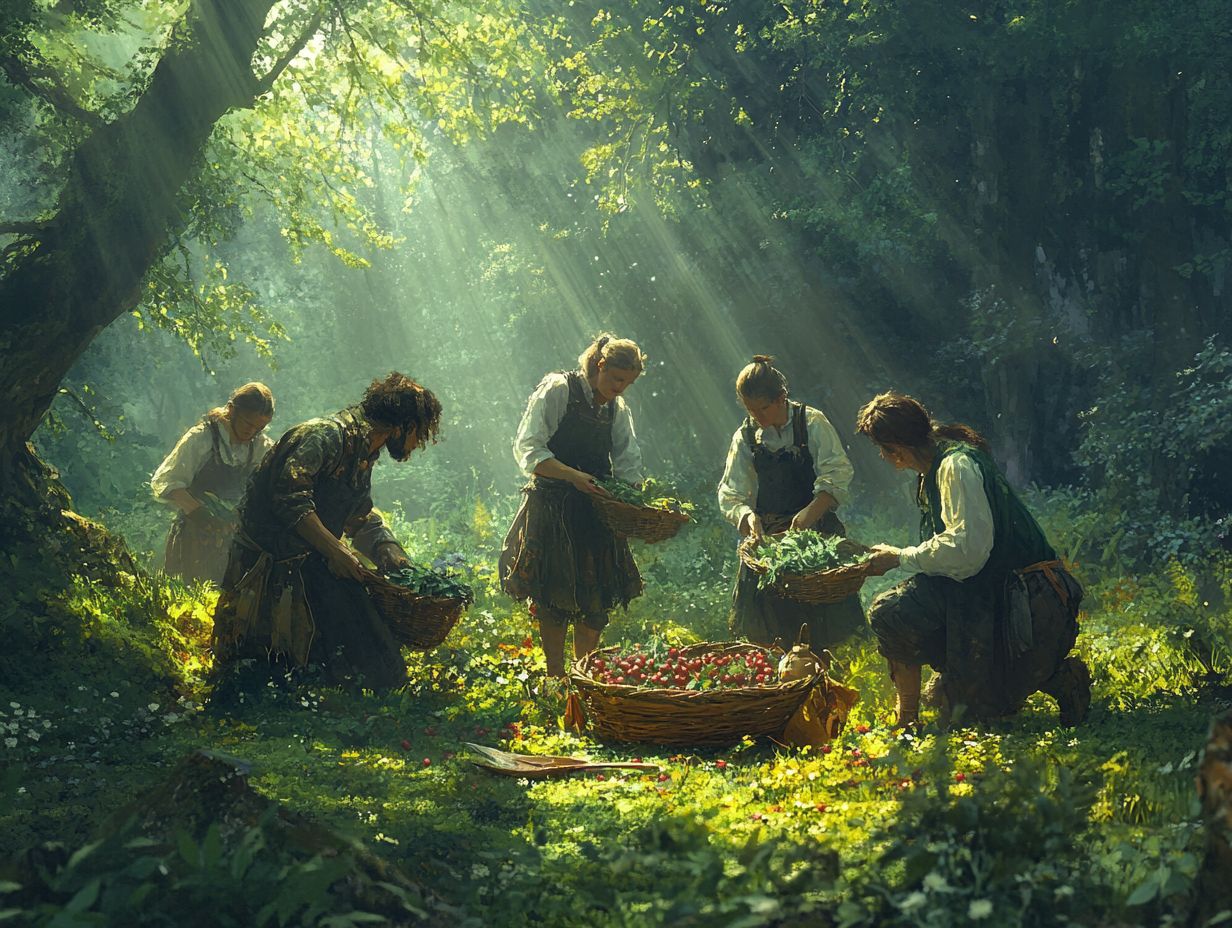
What are some examples of local resources that can be used for sustainable foraging?
You can find wild berries, mushrooms, herbs, and edible plants around you!
Is it legal to forage for wild plants and resources in my local area?
Check local laws before foraging! Some places have rules or need permits.
How can I ensure that I am foraging in a sustainable and ethical manner?
Only take what you need, and leave enough for nature to keep thriving. Avoid fragile areas and respect private land.
What are some benefits of using local resources for sustainable foraging?
Using local resources helps the environment and lets you connect with nature. Plus, you ll learn about your local ecosystem!
What tools or equipment do I need for foraging?
Grab a basket or bag for your finds, a knife or scissors, gloves, and a guidebook. These will make your foraging adventures safe and fun!
Are there any precautions I should take when foraging for local resources?
Always identify plants before eating them. Watch out for poisonous plants and wildlife!

